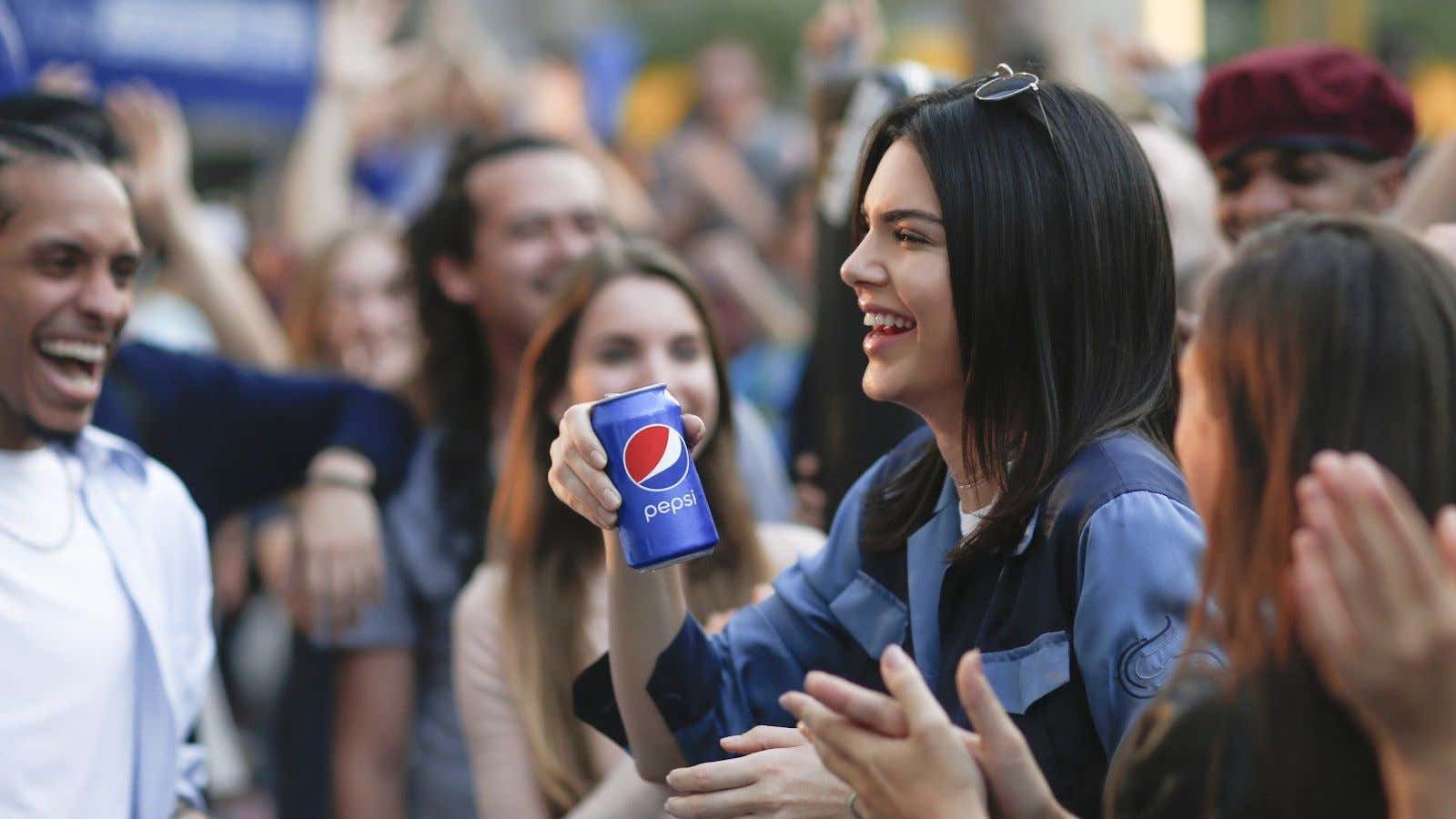This week, Pepsi Cola briefly became the unofficial drink of the vanquished. The company says it meant well by its choice to use images suggestive of the Women’s March and Black Lives Matter protests as product promotion in a new screen spot. But regardless of high-minded intention, when critics from both social and traditional media pointed out that the ad rang out about as loud and true as a plastic bell on a jester’s hat, they opted to withdraw it.
The ad takes the style of a black protest movement born from the real threat of police violence, and falsely places resolution into the non-black hands of a reality TV star. There is reason to be enraged by this clumsy theft. But if we admire the activism of Black Lives Matter, there is reason to be delighted that Pepsi failed so well.
“Clearly we missed the mark, and we apologize,” the company said in a statement. These are encouraging words to read, but not because a corporation has learned a lesson; the only knowledge that can be meaningfully taught to any corporation is contained in its quarterly reports. It is because Black Lives Matter remains a movement so free that it cannot be sold.
The theft of social movements by advertisers has a long history. Back in 1929, master propagandist Edward Bernays successfully conflated the idea of women’s suffrage with the idea of women smoking. His “Torches of Freedom” campaign remains an object lesson for advertisers of commodities produced for an ostensibly liberated female market. “Femvertising” crashes into every wave of the Western feminist movement: We saw it used by Virginia Slims shortly after the passage of the Equal Pay Amendment into law, just as we saw it in Dove’s more recent address to young women convinced of the need to declare their “Real Beauty.”
With a short film that depicts the reality-TV-star-turned-model Kendall Jenner as some sort of non-specific revolutionary, Pepsi says it had been striving to project “a global message of unity, peace and understanding.” But the ad has been widely seen as a consummate corporate failure to read the social era; critics were thorough and eager when faced with analyzing this total stinker.
To summarize: Jenner is cast as a fashion model. As she poses for photographs in a dress the texture of tinfoil, we see shots of a street demonstration behind her. All participants are conspicuously happy, reflective not of the mood we might actually see at a protest of the present, but of the hopes of a manufacturer’s executive. These are compliant and diverse customers who have a united demand for only one thing: a Pepsi. Their solidarity is soda.
The attempt to evoke the look of present-day movements, most particularly those by Black Lives Matter, is clear. Aside from that, everything else is murky: The placards we see make fizzy demands like “Join the conversation!” and the featured extras, such as a young hijab-wearing photographer with a piercing, use their right to free assembly largely as an opportunity to drink more Pepsi. Moved by this mass demand for sugar, Jenner rips off her blonde wig, smears away her berry lipstick, and somehow changes into off-the-rack denim as she demonstrates for the right to soda with her peers. Then, in an act of healing kindness, she offers an attractive police officer a Pepsi, which he smilingly accepts. It’s that final moment that has understandably provoked the most anger.
When the desire for social change can be turned into profitable promotion, the true activist does not sense victory, but the possibility of defeat. Outsiders don’t crave approval by mass marketers of their movements; they work toward real social transformation. The place to look for evidence of this is not in a major ad, nor even in the philanthropic budgets of corporations. The place to look is in the lives of the people, who, if black, remain unlikely to have their Pepsi warmly received by a militarized police force.
We do not improve society by improving its depiction in soft-drink ads. “Positive representation” in the promotion of goods is a sign of nothing but the desire to profit from the identity group positively represented. Companies are ultimately motivated only by profit, not true change.
That Black Lives Matter and its allies recognize this is cause for Pepsi’s embarrassment—and the rest of us can find cause for joy. If Black Lives Matter can resist the use of its images by a corporation, it may also be capable of true resistance against institutional racism.
